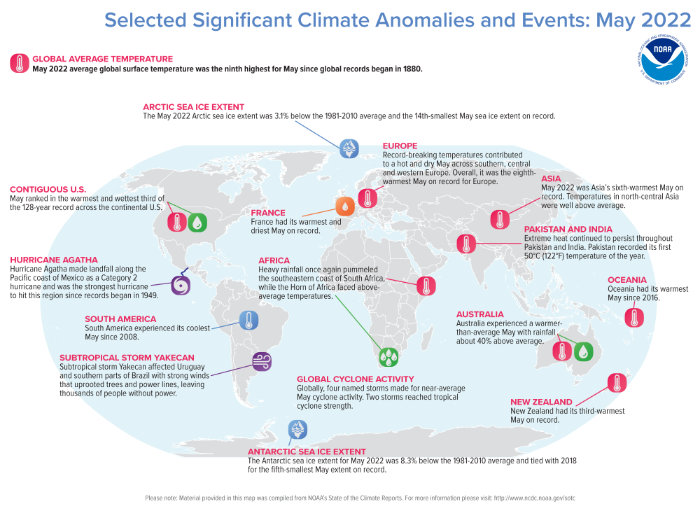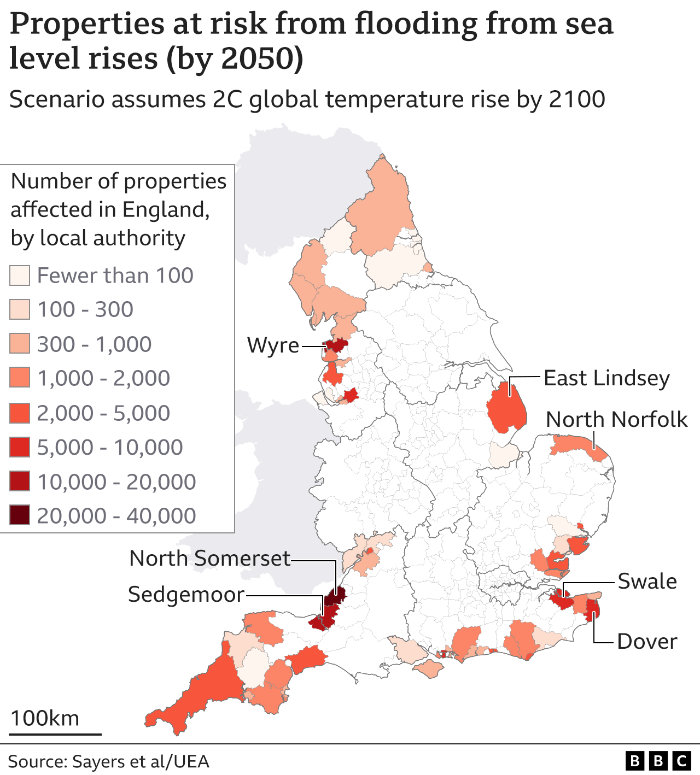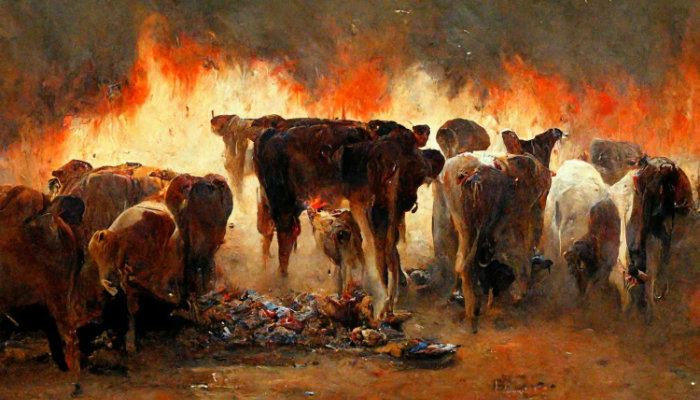In short:
- The US Federal Reserve, Bank of England, and Swiss National Bank all raised interest levels in extraordinary ways to counteract inflation
- Abbott’s baby formula factory closed again due to floods
- Thousands of cattle have died in Kansas due to heat stress
Economy, food security
The US Federal Reserve approved the biggest interest rate hike in 28 years. This is the third hike this year, and the largest since 1994. A half-point increase was expected, but the Fed took a more drastic measure after the latest consumer price report came out on June 10. The Fed is expected to raise rates four more times by the end of the year. Here’s an explainer about the move, and its possible consequences for both the US and the global economy. Opinion: ‘We are going to go into a really fast recession.’ A different point of view: Here’s why we are not at risk of a 70s-style recession. Bloomberg predicts the US will face a recession in Q1 2024:
NEW: The risk of a US recession by the first quarter of 2024 has hit 72% as the Fed hikes rates to curb inflation https://t.co/K72hguLWEC
— Bloomberg (@business) June 15, 2022
On the European front, the Bank of England raised interest rates for the fifth time this year, the Swiss National Bank raised interest rates for the first time in 15 years, and the European Central Bank will raise interest rates in July.
Bitcoin lost 50% of its value this year, and Coinbase is laying off 18% of its full-time employees, in preparation for recession and a ‘crypto winter.’ Here’s an explainer of what ‘crypto winter’ means, and here’s a short opinion piece about how long will it last.
Continuing on the explainer wagon, here’s what it means that the stock market has entered ‘bear’ territory.
Abbott’s baby formula factory closed again due to floods and will reopen in a few weeks. The company says it “has ample existing supply of EleCare” and other specialty formulas to last consumers until more is available.
Why should investors care about the environment? Some reasons why:
- $44 trillion of the world’s economic output is dependent on animals and ecosystems
- About three-quarters of the world’s food crops are pollinated by birds, bees, and other insects and small animals
- The population of birds, mammals, fish, reptiles, and amphibians has declined by 68% between 1970 and 2016
Case in point, thousands head of cattle in Kansas have died due to sharp temperature increases, humidity, and lack of wind. Each animal would have been worth around $2,000. According to a recent study, the global cattle farming industry will lose $15 to $40 billion every year by the end of the century, and beef and dairy production in the US will drop almost 7%. And people will lose food.
Gas, energy
An explosion shut down the Freeport, TX liquefied natural gas terminal, blocking exports to Europe and elsewhere. Freeport accounts for roughly 20% of the US LNG processing capacity. The terminal will reopen later this year.
Eight million people in Australia have been asked to turn off electricity for two hours every evening in order to prevent blackouts. Australia just went through the coldest start of winter in a long time. Here’s an explainer of Australia’s energy crisis.
Romania could become Europe’s energy power center. The previous regime left the country with two power plants and two more awaiting completion, and the possibility to take advantage of offshore gas fields in the Black Sea.
Climate, extreme weather
The latest NOAA report shows that May 2022 was the ninth warmest in 143 years, and the year is the sixth warmest on record. More extreme events for May:

La Niña is heading for a rare third year. If it happens, it would only be the third time since 1950. La Niña will keep worsening drought and fire risks in the Southwest, cold and stormy winters in the North (and Australia), intensifying spring tornadoes and bolstering the Atlantic hurricane season. Food for thought: la Niña cools down water temperatures in the Pacific, so this year’s temperatures would have been even higher if it wasn’t for La Niña. 🤯
Over a third of the US population (more than 125 million people) was urged to stay indoors amid record heat. A water line in Texas broke and left 165,00 houses and businesses without water while experiencing 100+ temperatures. The water treatment plant is back online and residents are under water boil notice for at least until Friday.
A river in Yellowstone National Park was pushed off course (maybe permanently) by heavy rain and rapid snowmelt. Hundreds of homes were damaged and 10,000 visitors were evacuated, but no one was hurt. Satellite photos show the devastation. The flood knocked out a water treatment plant and residents have been told to ration water or it will run out within 36 hours. The park could shut down for a week, and the northern entrances may not open until next summer. More flooding is forecast for this week.
Watch as falling rocks hit a car that was trying to leave through Yellowstone National Park's North Entrance on Sunday. Record flooding and rockslides prompted park officials to shut down all five entrances to inbound traffic into Yellowstone days later. https://t.co/p3i2wRXOwI pic.twitter.com/HIoV7Jj7Qa
— CBS News (@CBSNews) June 16, 2022
More than 30 wildfires have burned on Monday, scorching about one million acres across five states, and causing evacuations in Arizona and California.
California is facing drought, heat, power outages, and fires—all at once.
I often post relevant guides on how to prep for a whole range of scenarios, but this time I want to highlight this DIY rain barrel water collector by community member brownfox-ff. Just make sure to check your local water collecting laws before starting this or a similar project.
Hundreds of baby birds have recently died in Spain after leaving the nest prematurely to escape the heat. Spain is experiencing the earliest heat waves in 40 years. And New Zealand penguins have been dying off in the hundreds because high ocean temperatures are disrupting their food chain.
Rising sea levels are threatening 200,000 homes in England. The South West, North West, and East Anglia have the highest number of properties at risk of flooding:

The rest
Covid vaccinations for children under 5 could start as early as Tuesday. The state of Florida won’t be ordering the vaccines, but doctors, hospitals, and community centers can still order them.
The WHO will decide on June 23 whether to declare the monkeypox outbreak a public health emergency of international concern. Dr. Hans Kluge, the center’s director for Europe, said the outbreak is a real threat to public health, and the longer it circulates, the more people it could affect. WHO is procuring thousands of monkeypox tests for Africa but is not recommending mass vaccination at this stage.
An ad tracker is sending sensitive medical information to Facebook from hospital websites.
Scientists have mapped the best and worst places in the USA to be during a severe geomagnetic storm. The East coast is especially vulnerable.
Related:
- How to think about, protect against, and survive an EMP attack
- Your car will probably be fine after an EMP
- How long will GPS last if SHTF? What can break GPS?
- Russian roulette with the sun: An interview with John Kappenman
- Making and testing a trash can Faraday cage
- BBC looks in-depth at an “apocalyptic blackout”

You are reporting the comment """ by on